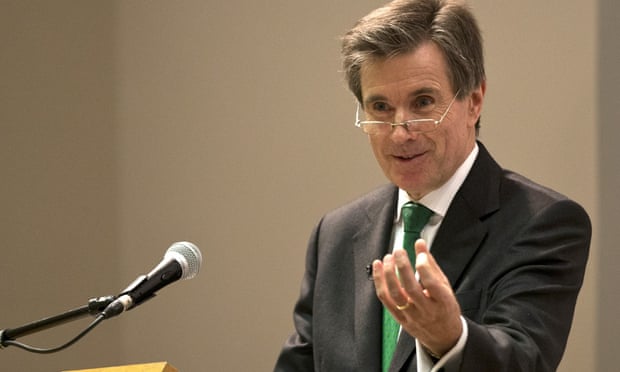John Sawers says defence spending needs to increase to counter Vladimir Putin’s actions and Europe needs to find a new way to coexist with Russia
John Sawers, who ran the Secret Intelligence Service for five years, said the threat posed by Moscow was not necessarily directly to the UK but to countries around its periphery. Photograph: Alastair Grant/AP
Sir John Sawers, who stepped down in 2014 after five years of running the Secret Intelligence Service, said the threat posed by Moscow was “not necessarily directly to the UK but to countries around its periphery”.
“The real problem is how we live with a Russia which feels very exposed. Putin’s actions are ones of a leader who believes his own security is at stake,” he told BBC Radio 4’s Today programme on Saturday.
Russia kept reminding the west that it had nuclear weapons, Sawers said, and it remained on the same level as the US in that regard. “We don’t want to have a repeat of the Cuban missile crisis in 1962 where we got to the brink of nuclear war. We need to be able to address this through increased dialogue.”
He said: “Europe and Russia are not converging with one another so we’re going to have to find a new way to coexist with Russia. We shouldn’t kid ourselves that Russia is on a path to democracy because it isn’t.”
The former spy chief called for defence spending to rise because it had fallen considerably as a proportion of GDP since the demise of the cold war.
“We’ve got to have the capability to deal with things like the hybrid warfare that we’ve seen Russia deploy, first in Crimea and then in the Donbass region. We’ve got to have the ability to deal with cyberwarfare,” Sawers said. “We’re going to have to spend more on our defence and our security because the threats are greater.”
Ministers are under increasing pressure from Tory MPs and senior military figures to commit Britain to meeting a Nato target to spend at least 2% of GDP on defence after 2016.
Sawers said the 2% target had a political significance, but Britain’s overall defence capability was more important: He said: “The level of threat posed by Moscow has increased and we have to be prepared to take the defensive measures necessary to defend ourselves, defend our allies – which now extend as far as the Baltic states and central Europe.”
The chancellor, George Osborne, is said to have warned MPs that defence spending could fall below this 2% level after the election as the austerity drive continued.
In response to the rise of Islamic State in the Middle East and the decision by some Britons to support the radical jihadists, Sawers said that Muslims were “less well integrated” into UK society due to a number of social and economic factors.
In his view, the Islamic religion was “not well geared to reviving and modernising itself so that it meets the values and the norms of a 21st century society”. Sawers said: “So there’s a big political challenge which can only really be taken up by leaders in the Islamic world … it can’t be imposed by the west.”
(Source: Chris Johnston and agencies)































